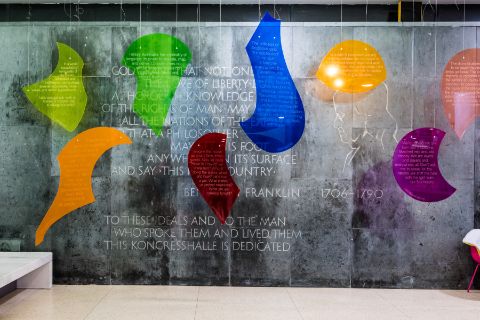For the Love of Liberty?
(En)Countering Franklin
Installation
2023–2027

Installation view. Photo: Laura Fiorio/HKW
HKW’s building is an architectural icon of post-war western modernity; as a political symbol, its history is in many ways written on its walls. Erected as the US contribution to Interbau 1957, the building’s ideologization is manifest not only in the fact that it was a gift offered by the United States to the the city of West Berlin in the context of the Cold War, but also in its architectural design and, concretely, in an inscription that greets visitors in the main lobby. Engraved into a stone wall, it reads, in English and German:
“God grant that not only the love of liberty, but a thorough knowledge of the rights of man may pervade all the nations of the earth so that a philosopher may set his foot anywhere on its surface and say ‘this is my country’.”
Benjamin Franklin
To these ideals and to the man who expressed them and lived by them, this Kongresshalle is dedicated.
In May 1955, a non-profit foundation was established under the leadership of US State Department official Eleanor Dulles to finance the construction of a Kongresshalle (Congress Hall). Developing the architectural concept, special emphasis was placed on the symbolic character of the building as a forum for the free exchange of ideas. Located in West Berlin, just a few hundred metres from the Soviet sector, the building was envisioned, in Eleanor Dulles’s words, as ‘a shining beacon beaming toward the East’. Regarded as the very embodiment of the idea of intellectual freedom, US Founding Father Benjamin Franklin (1706–1790), who was an owner of enslaved people, and a beneficiary of the trading of them, was chosen as the foundation’s name patron because the laying of the foundation stone for the Congress Hall coincided with his 250th anniversary. Franklin’s quote served as a reminder of the building’s mission, purpose, and ideological symbolism.
In 1989 the Kongresshalle was renamed and inaugurated as Haus der Kulturen der Welt. In this gesture, however, key aspects of imperialism and colonialism were largely overlooked in appraisals of the building’s history and its repurposing. There were only about 100 sovereign states in the world at the time the Kongresshalle was built, and the overwhelming majority of the additional 95 countries in existence today—including Cameroon, current director Prof Dr Bonaventure Soh Bejeng Ndikung’s country of birth—were yet to regain territorial and political sovereignty from various European colonial regimes. Simultaneously, the US had successfully framed its imperial expansion and extra-constitutional administration of American Samoa, Guam, the Commonwealth of the Northern Marianas, Puerto Rico, and the US Virgin Islands as a system of ‘overseas territories’, in addition to maintaining hundreds of US military bases on every single continent on earth.
In the context of US imperialism, habitually legitimized by claims made to ‘love of liberty’ and the ‘rights of man’, Franklin’s latent endorsement of an entitled approach to the world’s geographies has had far reaching implications. The key roles Eleanor Dulles and her brothers played in the US government and its aggressive foreign policy during the height of the Cold war serve as an example of this tradition. In the name of ‘defending freedom’ US Secretary of State (1953–59) John Foster Dulles (after whom the street in front of HKW is named) formulated the strategy of massive retaliation in 1954, encouraging the use of massive and disproportionate retaliatory power when attacked to act as a deterrent, and CIA director (1953–61) Allen Dulles oversaw covert operations overthrowing the governments in Iran and Guatemala.
HKW seeks to delimit the violent and singular imperial vision inherent in Franklin’s quote and actively question the paradigmatic implications of the semi-casual reference to the colonial playbook in the name of universalist values. HKW recognizes the need for other perspectives to question the monumentality, permanence, and ideological baggage of the quote, and to critically engage with Franklin’s historical authority over the building and the institutions that have occupied it. To this end, HKW invites over a dozen eminent figures across disciplines and geographies to contribute their own quotes in response to Franklin’s. These are presented alongside Franklin’s in the HKW lobby in the form of a semi-permanent installation designed by Studio Yukiko.